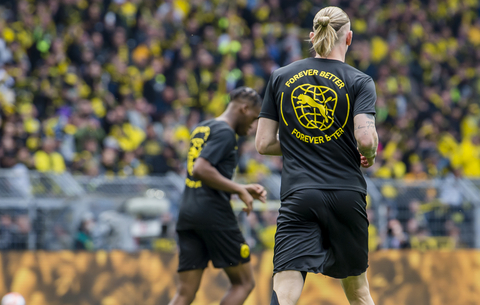Sports company PUMA and Borussia Dortmund swapped shirts with the fans at the Signal Iduna Park before kick off on Saturday to draw attention to the circularity project RE:JERSEY, in which PUMA tests an innovative recycling method.
This press release features multimedia. View the full release here: https://www.businesswire.com/news/home/20220502005397/en/

Sports company PUMA and Borussia Dortmund swapped shirts with the fans at the Signal Iduna Park before kick off on Saturday to draw attention to the circularity project RE:JERSEY, in which PUMA tests an innovative recycling method. (Photo: Business Wire)
Before the match against VfL Bochum, Borussia’s players warmed up wearing RE:JERSEYs, which were made with 75% repurposed football jerseys. Afterwards, BVB legends Roman Weidenfeller, Wolfgang “Teddy” de Beer and Norbert “Nobby” Dickel encouraged the fans to donate their old polyester items. In exchange, a few lucky fans received RE:JERSEYs signed by the players.
In the RE:JERSEY project, PUMA tests an innovative chemical recycling process, which turns old polyester garments into new jerseys. The goal of this project is to reduce waste and pave the way towards more circular production methods.
“We are certain that we will continue our ambitious path towards more sustainable production models with the RE:JERSEY project,” said Matthias Baeumer, General Manager BU Teamsport at PUMA. “Our partnership with BVB is very strong and we are glad that they are supporting us as part of this innovative trial.”
Starting Monday, PUMA and BVB will set up collection bins, where fans will be able to donate their old polyester items, which will be used for the RE:JERSEY project. The fans who donate old items, can also take part in a draw to win great prizes such as signed jerseys. More information can be found on https://www.bvb.de/eng/puma-re-jersey .
“We see a growing interest from our fans in sustainable merchandising and that they are more aware of sustainability topics,” said Kerstin Zerbe, Managing Director of BVB Merchandising GmbH. “We are glad that our collection points at FanWelt will contribute towards making our jerseys more circular in the future. We share this ambition with our partner PUMA.”
The RE:JERSEYs worn by BVB players during the warm up on Saturday were made with 75% repurposed football jerseys. The remaining 25% comes from SEAQUAL ® MARINE PLASTIC1.
In the recycling process used for the RE:JERSEY project, the garments are chemically broken down into their main components (depolymerization). Colors are then filtered out and the material is chemically put back together to create a yarn (repolymerization) that has the same performance characteristics as virgin polyester.
Next to BVB, PUMA teams Manchester City, AC Milan and Olympique de Marseille are also a part of this project.
PUMA
PUMA is one of the world’s leading sports brands, designing, developing, selling and marketing footwear, apparel and accessories. For more than 70 years, PUMA has relentlessly pushed sport and culture forward by creating fast products for the world’s fastest athletes. PUMA offers performance and sport-inspired lifestyle products in categories such as Football, Running and Training, Basketball, Golf, and Motorsports. It collaborates with renowned designers and brands to bring sport influences into street culture and fashion. The PUMA Group owns the brands PUMA, Cobra Golf and stichd. The company distributes its products in more than 120 countries, employs about 16,000 people worldwide, and is headquartered in Herzogenaurach/Germany.
[1] SEAQUAL ® MARINE PLASTIC
SEAQUAL® MARINE PLASTIC is a sustainable and fully traceable raw material from SEAQUAL INITIATIVE that is made from marine litter, or in some cases from end-of-life fishing nets or other plastics used in aquaculture (such as those used in mussel and oyster farming). For more information, visit https://www.seaqual.org
View source version on businesswire.com: https://www.businesswire.com/news/home/20220502005397/en/
Contacts
Media:
Robert-Jan Bartunek - Corporate Communications - PUMA - +49 9132 81 3134 – robert.bartunek@puma.com







